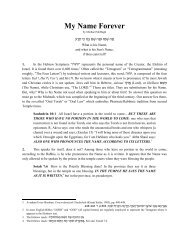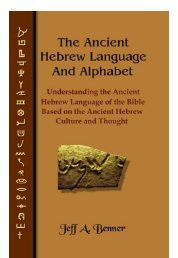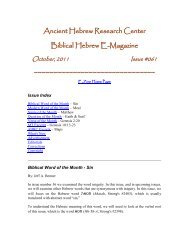Dating the Book of Job (PDF) - Ancient Hebrew Research Center
Dating the Book of Job (PDF) - Ancient Hebrew Research Center
Dating the Book of Job (PDF) - Ancient Hebrew Research Center
You also want an ePaper? Increase the reach of your titles
YUMPU automatically turns print PDFs into web optimized ePapers that Google loves.
<strong>Dating</strong> <strong>the</strong> <strong>Book</strong> <strong>of</strong> <strong>Job</strong> 25<br />
Table 6: Partial List <strong>of</strong> Explanatory Glosses in <strong>the</strong> <strong>Book</strong> <strong>of</strong> Deuteronomy<br />
Deuteronomy 1:1-5 Deuteronomy 3:13b-14<br />
Deuteronomy 2:10-12 Deuteronomy 3:17 – “<strong>the</strong> Salt Sea”<br />
Deuteronomy 2:20-23 Deuteronomy 4:41-49<br />
Deuteronomy 3:9 Deuteronomy 10:6-9<br />
Deuteronomy 3:11 – “Is it not in Rabbah <strong>of</strong> <strong>the</strong> people <strong>of</strong> Ammon?” Deuteronomy 34:10-12<br />
As illustrated in Figure 3 above, fragments 3 and 5 appear to have been shuffled up in <strong>the</strong><br />
ordering and <strong>the</strong> text that is now Numbers 28 and 29 appears to have been appended to fragment 5.<br />
It is left to <strong>the</strong> reader to read <strong>the</strong> verses in question in <strong>the</strong> hypo<strong>the</strong>sized original order and judge for<br />
him/her-self how much better <strong>the</strong> text flows. Seeing that <strong>the</strong> Pharisees <strong>of</strong> Jesus’ day were notorious<br />
for adding to <strong>the</strong> law, it should not be considered out <strong>of</strong> <strong>the</strong> question that such was done at earlier<br />
times in history as well.<br />
It is important to notice that <strong>the</strong> text <strong>of</strong> <strong>the</strong> book <strong>of</strong> Deuteronomy is riddled with several explanatory<br />
glosses which were added to <strong>the</strong> text by later scribes. Because <strong>of</strong> <strong>the</strong> transition from third<br />
person to first between verses 5 and 6 in <strong>the</strong> opening chapter <strong>of</strong> Deuteronomy, Deuteronomy 1:1-<br />
5 should be considered one <strong>of</strong> <strong>the</strong> explanatory glosses which were written long after <strong>the</strong> events<br />
transpired. A good translation will have most <strong>of</strong> <strong>the</strong> explanatory glosses <strong>of</strong> Deuteronomy clearly<br />
marked as paren<strong>the</strong>tical inserts. Upon inspection, one should be easily convinced that <strong>the</strong>se paren<strong>the</strong>tical<br />
remarks were added at a much later date. Table 6 lists several <strong>of</strong> <strong>the</strong> explanatory glosses<br />
that are scattered throughout <strong>the</strong> text <strong>of</strong> <strong>the</strong> book <strong>of</strong> Deuteronomy.<br />
Note that because <strong>the</strong> fortieth year was an even year, <strong>the</strong> eleventh month and <strong>the</strong> fifth month<br />
would be <strong>the</strong> same month depending upon whe<strong>the</strong>r one was using a twelve-month or six-month<br />
calendar; so Deuteronomy 1:3 isn’t necessarily inaccurate – it is just using a different calendar<br />
because it was written at a later date.<br />
Because <strong>the</strong> story <strong>of</strong> Noah’s flood refers to months <strong>of</strong> higher ordinal value than six in a relative<strong>of</strong>fset<br />
context and not a absolute-date context, it does not contradict <strong>the</strong> six-month-year <strong>the</strong>ory.<br />
Because <strong>the</strong>re is evidence that <strong>the</strong> texts which reference <strong>the</strong> festivals <strong>of</strong> <strong>the</strong> seventh month were<br />
retroactively edited, <strong>the</strong>y do not contradict <strong>the</strong> six-month-year <strong>the</strong>ory. Because Deuteronomy 1:3<br />
is part <strong>of</strong> an explanatory gloss and because <strong>the</strong> parallel accounts <strong>of</strong> <strong>the</strong> events leading up to <strong>the</strong> occasion<br />
spoken <strong>of</strong> in Deuteronomy 1:3 which are given in Numbers 20:14-22:1 and Numbers 33:37-<br />
49 suggest a shorter time frame than what <strong>the</strong> combination <strong>of</strong> Deuteronomy 1:3 with <strong>the</strong> parallel<br />
accounts would indicate if a twelve-month calendar were being used in both accounts, Deuteronomy<br />
1:3 does not conclusively contradict <strong>the</strong> six-month-year <strong>the</strong>ory. Because <strong>the</strong>re is strong support<br />
for <strong>the</strong> six-month-year <strong>the</strong>ory and no strong evidence against it, <strong>the</strong> six-month-year <strong>the</strong>ory will<br />
be used in deriving <strong>the</strong> dates and lengths <strong>of</strong> time for relevant events discussed henceforth.<br />
Stephen Franklin also suspects that <strong>the</strong> ages <strong>of</strong> some <strong>of</strong> <strong>the</strong> more ancient biblical characters<br />
have been multiplied by factors even greater than two. He introduces his <strong>the</strong>ory as a “ma<strong>the</strong>matical<br />
extension” <strong>of</strong> <strong>the</strong> doubling that has been discussed thus far. While <strong>the</strong> doubling <strong>the</strong>ory has a basis<br />
in <strong>the</strong> structure <strong>of</strong> <strong>the</strong> <strong>Hebrew</strong> calendar and a great deal <strong>of</strong> corroborating evidence in <strong>the</strong> text <strong>of</strong><br />
<strong>the</strong> Bible itself, <strong>the</strong> <strong>the</strong>ory that <strong>the</strong> ages <strong>of</strong> <strong>the</strong> patriarchs who lived prior to Abraham have been<br />
inflated by factors larger than two appears to have considerably less support. Stephen Franklin






